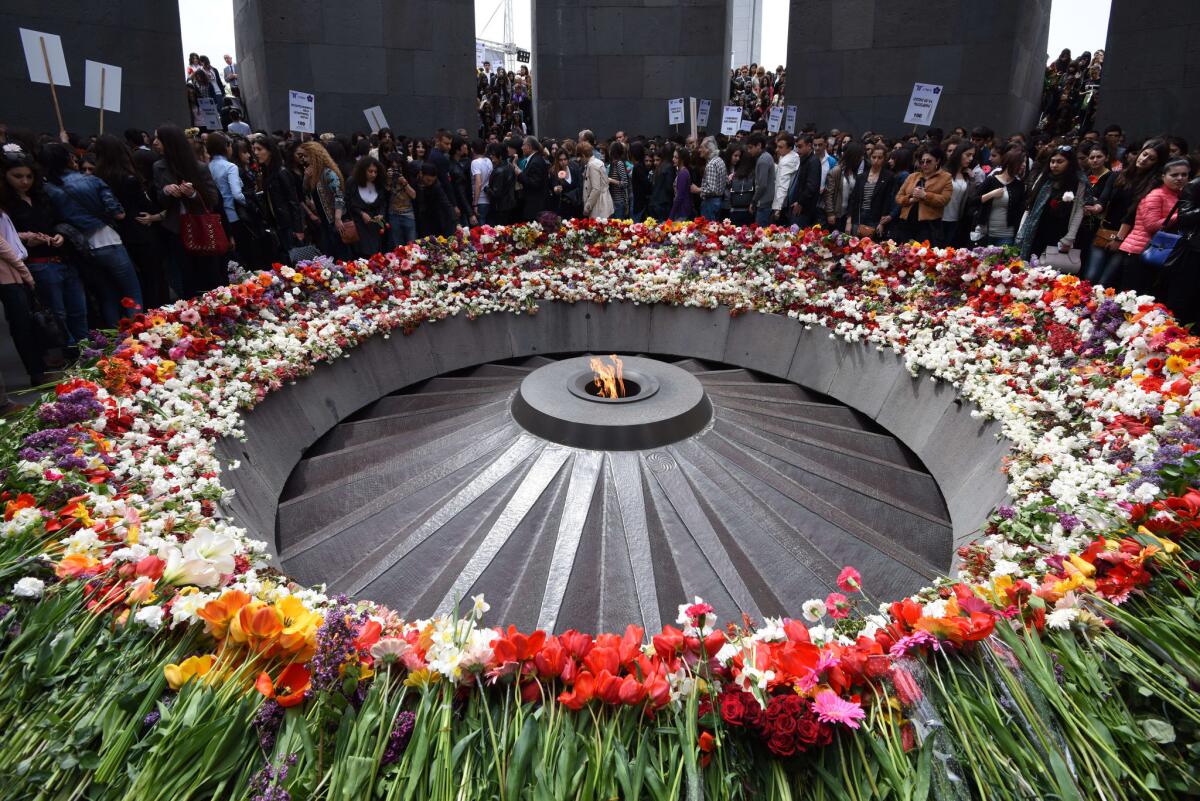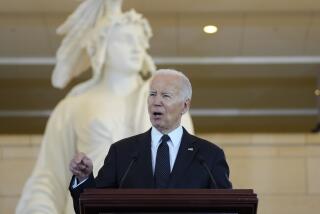Armenian hopes crushed as Obama decides not to use the word ‘genocide’

People lay flowers at the Tsitsernakaberd Armenian Genocide Memorial in Yerevan, Armenia, on Tuesday.
- Share via
Reporting from Washington — White House officials have decided that President Obama will not use the word “genocide” to describe the killings of more than 1 million Armenians at the hands of Ottoman Turks when he commemorates the deaths Friday, the 100th anniversary of the massacres.
The decision, revealed Tuesday in a meeting with Armenian American groups, backs down from a previous Obama pledge.
“As president I will recognize the Armenian Genocide,” Obama said while running for president in 2008.
His decision not to do so now sparked anger from activists.
“The president’s surrender represents a national disgrace,” said Aram S. Hamparian, executive director of the Washington-based Armenian National Committee of America. “It is a betrayal of the truth, and it is a betrayal of trust.”
White House officials defended the decision as necessary to preserve the chance of cooperation with Turkey, a NATO ally, on Middle Eastern conflicts.
The Turkish Embassy, which has spent millions lobbying Congress on the issue, did not respond to a request for comment. the Turkish government has said that the mass killings do not meet the legal definition of genocide and that it would be a mistake for the U.S. to use the term. Some members of Congress have also warned that a shift in official U.S. references could hurt American foreign policy.
California has the country’s largest population of people of Armenian descent, with more than 200,000 living in Los Angeles County, according to U.S. Census data.
Rep. Adam B. Schiff (D-Burbank), who has led efforts in Congress to recognize the genocide, said he was “deeply disappointed” by the decision.
“How long must the victims and their families wait before our nation has the courage to confront Turkey with the truth about the murderous past of the Ottoman Empire? If not this president, who spoke so eloquently and passionately about recognition in the past, whom? If not after 100 years, when?” he said in a statement.
After the meeting with Armenian American groups, White House officials released a statement that did not use the word “genocide.” The statement from National Security Council spokeswoman Bernadette Meehan said the U.S. would use the anniversary of the onset of the massacres to “urge a full, frank and just acknowledgment of the facts that we believe is in the interest of all parties.”
A senior administration official, speaking on condition of anonymity to comment on a diplomatically delicate issue, said the White House expects Obama to mark “the historical significance” of the Meds Yeghern, as the massacres are known in Armenian.
“We know and respect that there are some who are hoping to hear different language this year. We understand their perspective,” the official said.
But, the official added, “the approach we have taken in previous years remains the right one, both for acknowledging the past, and for our ability to work with regional partners to save lives in the present,” a reference to U.S. hope for cooperation from Turkey, particularly in the civil war in Syria.
White House national security advisor Susan Rice met Tuesday afternoon with Turkish Foreign Minister Mevlut Cavusoglu and urged him “to take concrete steps to improve relations with Armenia and to facilitate an open and frank dialogue in Turkey about the atrocities of 1915,” the White House said in a statement.
Hamparian said he and other Armenian American leaders learned the news at their White House meeting, which was attended by Denis McDonough, Obama’s chief of staff, and Ben Rhodes, deputy national security advisor.
During the meeting, which lasted just short of an hour, Hamparian said, the group was told that the U.S. would send a delegation to Armenia this week, led by Treasury Secretary Jacob Lew.
The delegation will also include Rep. Jackie Speier (D-Hillsborough), who said in a statement, “I intend to call it what it was — I will call it a genocide everywhere I go.”
An estimated 1.5 million Armenians were killed starting in 1915 amid the chaotic collapse of the Ottoman Empire.
Whether to use the word “genocide” to describe those killings has been a fraught political issue for years. Turkish officials base their argument that the killings do not meet the definition of genocide on the claim that no deliberate plan to eliminate Armenian populations was involved. Most historians, however, have concluded that the use of the word is appropriate.
U.S. administrations of both parties have resisted using the word out of deference to Turkey.
Activists had hoped Obama would change that this year, particularly after Pope Francis referred to genocide in a statement just over a week ago.
“Given Pope Francis and his statement, the European Parliament, the German chancellor [Angela Merkel], all coming out in the last many days encouraging Turkey to come to terms with its past, we had hoped and expected that President Obama would have done the same,” said Bryan Ardouny, executive director of Armenian Assembly of America.
Obama, as a senator and a candidate for president, supported using the term to describe the killings and criticized the George W. Bush administration for not doing so.
“Armenian genocide is not an allegation, a personal opinion, or a point of view, but rather a widely documented fact supported by an overwhelming body of historical evidence,” Obama said in 2008. “The facts are undeniable. An official policy that calls on diplomats to distort the historical facts is an untenable policy.”
Follow @NoahBierman on Twitter.
More to Read
Sign up for Essential California
The most important California stories and recommendations in your inbox every morning.
You may occasionally receive promotional content from the Los Angeles Times.











